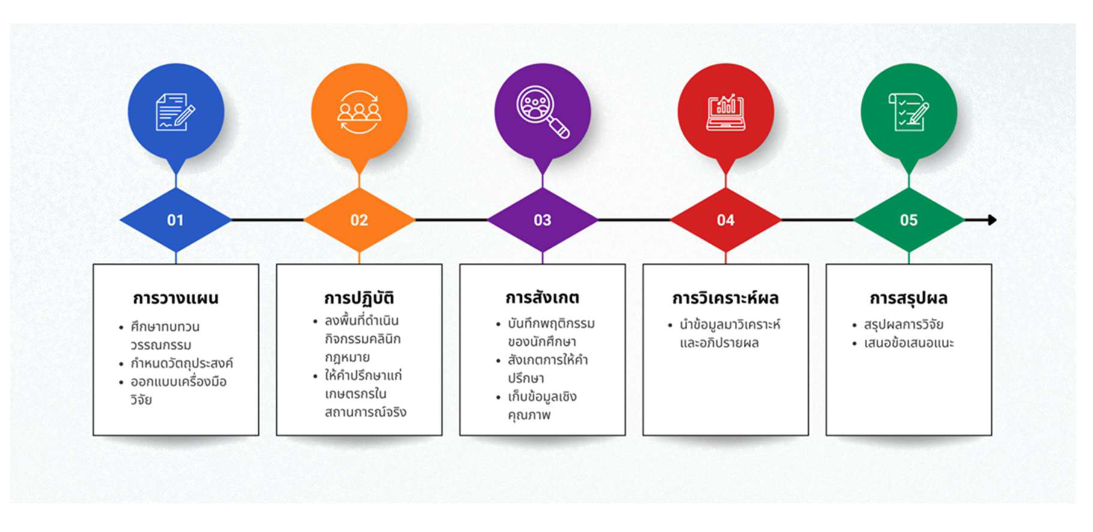The Mobile Legal Clinics for Enhancing Farmers’ Quality of Life and Approaches to Developing Legal Education in Thailand : A Case Study of Fao Rai Subdistrict, Nong Khai Province, and Si Suttho Subdistrict, Udon Thani Province
Abstract
Clinical legal education is an instructional approach that emphasises experiential learning through real-world practice. It fosters the development of legal skills and instils a sense of social responsibility in students. This research aims to examine the impact of clinical legal education on the development of professional skills and a sense of justice among third-year law students at Udon Thani Rajabhat University. Furthermore, it analyses the outcomes of mobile legal clinic activities conducted for farmers in Fao Rai Subdistrict, Nong Khai Province, and Si Suttho Subdistrict, Udon Thani Province. The objective is to propose guidelines for integrating clinical legal education into legal instruction in Thailand. The study employs qualitative research methods, including in-depth interviews, participant observations, and document analysis. The findings indicate that clinical legal education enhances various legal competencies in students, such as legal problem analysis, communication skills, and the ability to provide legal counsel. Additionally, it instils a sense of responsibility to provide legal services to underprivileged individuals. Moreover, the mobile legal clinic activities for farmers have improved access to legal services in rural areas, offering guidance on legal issues such as land tenure disputes, undocumented land sale contracts, and mortgage agreements. Based on the research findings, it is recommended that educational institutions integrate clinical legal education into the Bachelor of Laws curriculum to align with the 2022 Thai Qualifications Framework for Higher Education, which emphasises learning outcomes derived from practical engagement, analytical problem-solving, legal counselling, and dispute resolution. The study also recommends the expansion of mobile legal clinic projects to other communities to broaden access to justice and extend legal assistance to disadvantaged populations.
Downloads
Article Details
How to Cite
Section
Research Articles
Copyright & License
Copyright (c) 2025 Arts and Culture Journal of the Lower Moon River

This work is licensed under a Creative Commons Attribution-NonCommercial-NoDerivatives 4.0 International License.
All articles published open access under the CC BY-NC-ND 4.0 license will be immediately and permanently free for everyone to read, download, copy, distribute, print, search, or link to articles free of charge. Use of the articles is permitted for non-commercial purposes only and without modifications. Access does not require prior permission from the publisher or the author, provided that the original publication is appropriately and adequately cited.
References
ชาญชัย ชัยสุวรรณ. (2560). การศึกษากฎหมายเชิงคลินิก : จากทฤษฎีสู่ปฏิบัติ. วิญญูชน.
นิภาภรณ์ ลาภเสถียร. (2567). การพัฒนานิสิตเพื่อบรรลุผลลัพธ์การเรียนรู้ในรายวิชาคลินิกกฎหมายเอกชนด้วยการจัดการเรียนรู้โดยกระบวนการกลุ่ม และการเรียนรู้ด้วยกรณีศึกษา. วารสารนิติศาสตร์ มหาวิทยาลัยพะเยา, 3(2), 53 - 66.
พรรณรายรัตน์ ศรีไชยรัตน์. (2555). การศึกษากฎหมายเชิงคลินิก : ทางเลือกในการปฏิรูปการศึกษากฎหมายไทย. วารสารนิติศาสตร์ มหาวิทยาลัยนเรศวร, 5(2), 80 – 108.
Bloch, F. S. (2011). The Global Clinical Movement : Educating Lawyers for Social Justice. Oxford Academic. https://doi.org/10.1093/acprof:oso/9780195381146.001.0001.
Bringle, R. G. (1997). Service-Learning in Higher Education: Concepts and Practices. The Journal of Higher Education, 68(6), 715 – 717. https://doi.org/10.1080/00221546.1997.11779010.
Giddings, J. (2008). Contemplating the Future of Clinical Legal Education. Griffith Law Review, 17(1), 1 – 26. https://doi.org/10.1080/10383441.2008.10854600.
Grimes, R., Brayne, H., & Duncan, N. (1998). Clinical Legal Education : Active Learning in Your Law School. Blackstone Press.
Kolb, A. Y., & Kolb, D. A. (2021). The Experiential Educator : Principles and Practices of Experiential Learning. Experience Based Learning Systems.
Kruse, K. R. (2011). Getting Real About Legal Realism, New Legal Realism, and Clinical Legal Education. New York Law School Law Review, 56(2011/12), 295 - 320.
Llewellyn, K. N. (1935). On What is Wrong with So-called Legal Education. Columbia Law Review, 35(4), 651 – 678.
Madhloom, O., & McFaul, H. (2021). Thinking About Clinical Legal Education : Philosophical and Theoretical Perspectives. Routledge. https://doi.org/10.4324/9780429299247.
Samuel-Siegel, D. (2022). Reckoning with Structural Racism in Legal Education: Methods Toward a Pedagogy of Antiracism. Cardozo Journal of Equal Rights and Social Justice, 29(1), 1.
Stevens, R. B. (1983). Law School : Legal Education in America from the 1850s to the 1980s. University of North Carolina Press.





